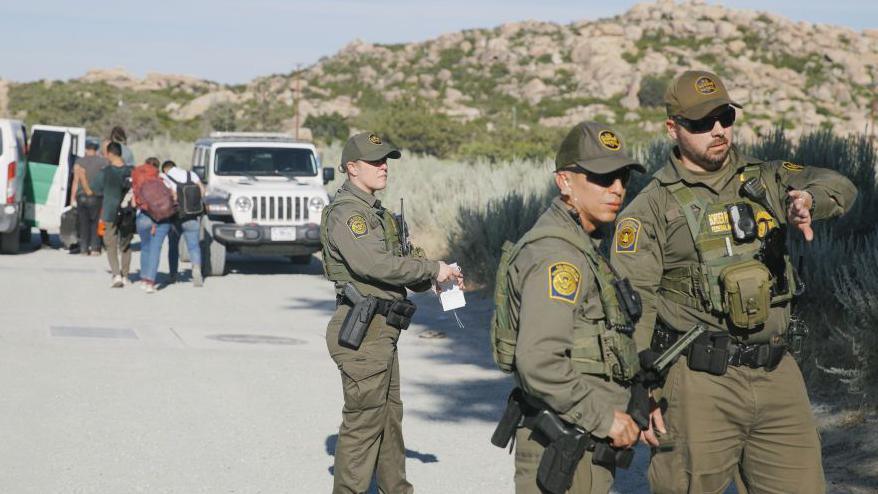Migrants with criminal records - what new US data shows

- Published
Newly-released figures about migrants with criminal convictions are being used to attack Democrats for the border policies under President Biden and Kamala Harris.
Donald Trump has used the figures to claim that "13,000 convicted murderers entered our country during her three and a half year period as Border Czar" and said they were allowed to "openly roam our country".
But both claims are misleading.
The new figures released by Immigration and Customs Enforcement (ICE) do show some 13,000 non-citizens convicted of homicide were on its records and not in its custody.
However, the Department of Homeland Security (DHS), which oversees ICE, said the figures cover a period of many years, and include migrants who entered the US under the Trump presidency and previous administrations.
It also said that those on the list may not be in ICE custody but could be detained or in prison under the supervision of other agencies.
What do the figures show?
The figures were released in a letter from ICE , externalto Republican congressman Tony Gonzales, who had requested them.
They show that, as of July 2024, there were 425,431 non-citizens with criminal convictions on ICE’s "non-detained docket" - a database of people facing deportation proceedings but who are not held in ICE custody.
Of these:
13,099 were convicted of homicide
15,811 were convicted of sexual assault
62,231 were convicted of assault
However, a DHS statement said the data had been “misinterpreted".
“It also includes many who are under the jurisdiction or currently incarcerated by federal, state or local law enforcement partners,” the DHS said.
So, just because they are not being held by ICE, it does not mean they are all "roaming freely", as Trump claims.
“For example, Zacarias Moussaoui, who’s in a maximum security prison in Colorado for his role in the 9/11 attacks, is not currently detained by ICE so will likely be on that list,” says Aaron Reichlin-Melnick, an immigration enforcement expert at the American Immigration Council.
BBC Verify has asked the DHS how many are being held in detention by other agencies.
How many of them came under Biden and Harris?
Trump said that the 13,000 convicted of killing someone entered the US under the Biden-Harris administration, but the ICE figures do not state when these people came to America.
The DHS said: "The data goes back decades; it includes individuals who entered the country over the past 40 years or more, the vast majority of whose custody determination was made long before this [Biden-Harris] administration."
The non-detained docket is not routinely released and it is only published under certain circumstances on request - so we do not have exact numbers under each administration.
The numbers were previously published in June 2021, external, five months into the Biden presidency, which showed there were 405,431 convicted criminals on the list at that time.
Before that, an official report published in August 2016, external, towards the end of Barack Obama's presidency, showed 368,574.
So, the list grew by almost 37,000 over five years, which includes Trump’s term in office.
“This data shows a significant number would have gotten on the list during the prior administrations, and the docket has grown under multiple administrations, including the Trump one,” said Michelle Mittelstadt of the Migration Policy Institute.
The overall number of non-citizens on the list has increased in recent years due to high levels of immigration under President Biden.
“Although, the number of people on the non-detained docket has increased substantially under the Biden administration, the number of people who are convicted criminals on the list hasn’t,” says Mr Reichlin-Melnick.
In the letter, ICE does not specify how many of the non-citizens with criminal convictions on its list are illegal immigrants and how many entered the US with, for example, a green card.
BBC Verify has asked for a breakdown.
How many migrants have crossed the US border illegally?
- Published29 September 2024
Why is it difficult to remove some criminals from the US?
Part of the reason why overall numbers are high, experts say, is because of problems with deporting certain non-citizens who have committed crimes.
“The US government cannot put a person on a commercial or government flight to return them to their country of nationality without agreement by that country,” says Michelle Mittelstadt.
“Because the US has very limited diplomatic relations with Venezuela, Cuba, and Nicaragua, for example, deportation flights and returns to those countries are rare.”
There are federal laws in place which mean people can only be held in detention for six months before the US government has to show they are a danger to the community.
The UN Convention Against Torture means some immigrants, even those convicted of serious crimes, can have their deportation deferred if judges determine they would likely be tortured or persecuted in their home countries.
DHS says it has removed over 180,000 non-citizens with criminal convictions since January 2021.

